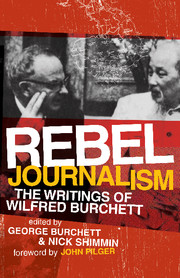Book contents
- Frontmatter
- Contents
- List of Photographs
- Acknowledgements
- Foreword by John Pilger
- Foreword by Gavan McCormack
- Introduction
- 1 The Atomic Plague [1945]
- 2 With Mick Griffith to the Plaine des Lacs [1941]
- 3 Who is Wingate Anyway? [1944]
- 4 The Trial of Cardinal Mindszenty [1951]
- 5 Liberty in Eastern Europe [1951]
- 6 The Microbe War [1953]
- 7 Koje Unscreened [1953]
- 8 The Ball-Point Pen Murders [1954]
- 9 South of the 17th Parallel [1955]
- 10 Front-Line Village [1959]
- 11 Welcome Home [1961]
- 12 Gagarin: The First Interview with Western Journalists [1961]
- 13 Virgin Lands [1962]
- 14 Lilac and Outer Space [1962]
- 15 War Against Trees [1963]
- 16 The Tragedy of South Vietnam's Ethnic Minorities [1964]
- 17 Interview with General Vo Nguyen Giap (April 13, 1964)
- 18 A Fortified Hamlet [1965]
- 19 Patriots & Mercenaries [1965]
- 20 At Ground Level [1966]
- 21 A Spurned Olive Branch [1967/1977]
- 22 Personal Leader [1968]
- 23 The Tet of Peace [1973/1977]
- 24 ‘Something from Nothing’ Township [1976]
- 25 Evaluating the Past [1976]
- 26 Mercenaries: British Export Model [1977]
- 27 The Geneva Conference [1978]
- 28 How to be a Good Khmer Rouge [1981]
- 29 China Prepares to Attack Vietnam [1981]
- 30 Afterword [1983]
- Notes
- Bibliography
- Index
7 - Koje Unscreened [1953]
Published online by Cambridge University Press: 22 September 2009
- Frontmatter
- Contents
- List of Photographs
- Acknowledgements
- Foreword by John Pilger
- Foreword by Gavan McCormack
- Introduction
- 1 The Atomic Plague [1945]
- 2 With Mick Griffith to the Plaine des Lacs [1941]
- 3 Who is Wingate Anyway? [1944]
- 4 The Trial of Cardinal Mindszenty [1951]
- 5 Liberty in Eastern Europe [1951]
- 6 The Microbe War [1953]
- 7 Koje Unscreened [1953]
- 8 The Ball-Point Pen Murders [1954]
- 9 South of the 17th Parallel [1955]
- 10 Front-Line Village [1959]
- 11 Welcome Home [1961]
- 12 Gagarin: The First Interview with Western Journalists [1961]
- 13 Virgin Lands [1962]
- 14 Lilac and Outer Space [1962]
- 15 War Against Trees [1963]
- 16 The Tragedy of South Vietnam's Ethnic Minorities [1964]
- 17 Interview with General Vo Nguyen Giap (April 13, 1964)
- 18 A Fortified Hamlet [1965]
- 19 Patriots & Mercenaries [1965]
- 20 At Ground Level [1966]
- 21 A Spurned Olive Branch [1967/1977]
- 22 Personal Leader [1968]
- 23 The Tet of Peace [1973/1977]
- 24 ‘Something from Nothing’ Township [1976]
- 25 Evaluating the Past [1976]
- 26 Mercenaries: British Export Model [1977]
- 27 The Geneva Conference [1978]
- 28 How to be a Good Khmer Rouge [1981]
- 29 China Prepares to Attack Vietnam [1981]
- 30 Afterword [1983]
- Notes
- Bibliography
- Index
Summary
The prisoner of war issue was a major stumbling block during the ceasefire talks in Korea, each side accusing the other of atrocities, presenting lists and counter-lists of prisoners and trying to score propaganda points. Wilfred Burchett set out to investigate the veracity of each side's claims and thus, for instance, established that the highest-ranking US POW in Korea, General William Dean, who had been reported dead, was indeed alive and well. He also contrasted the generally good conditions he had observed in North Korean and Chinese-run POW camps with the reportedly appalling conditions and brutality in Allied prisoner of war camps, though in writing about this he indulged in some hyperbolic language he would later regret using.
Koje Island was South Korea's most populous prison camp and became notorious as the scene of riots between Communist and non-Communist POWs over the issue of forced repatriation or ‘screening’. Their actions were brutally suppressed by their American captors, and the story of that suppression is covered here by Burchett with his colleague Alan Winnington. They wrote two books together, Koje Unscreened and Plain Perfidy (see Chapter 8). The contents were based largely on interviews with prisoners who had escaped from Koje Island, and on other eyewitness accounts, rather than Burchett's usual ‘on the spot’ reporting.
* * *
… The order for ruthless and energetic action must be given at the slightest indication of insubordination, especially in the case of Communist fanatics. Insubordination, active or passive resistance, must be broken immediately by force of arms (bayonets, butts and firearms)… Prisoners of war attempting to escape are to be fired on without previous challenge… The use of arms against prisoners of war is as a rule legal …
- Type
- Chapter
- Information
- Rebel JournalismThe Writings of Wilfred Burchett, pp. 69 - 78Publisher: Cambridge University PressPrint publication year: 2007



